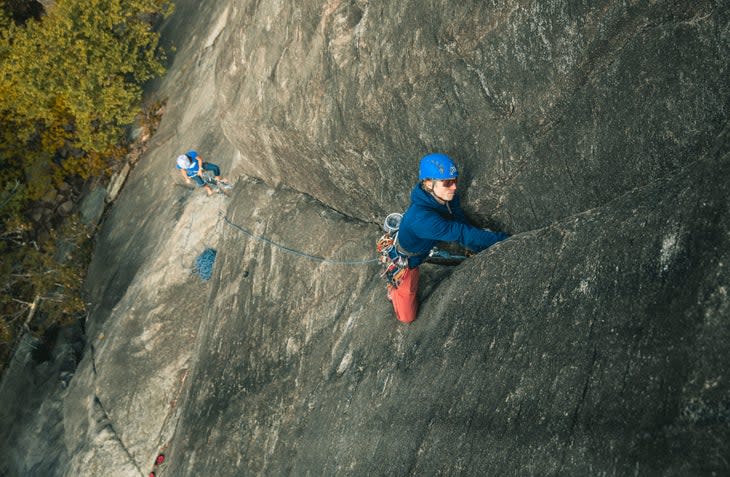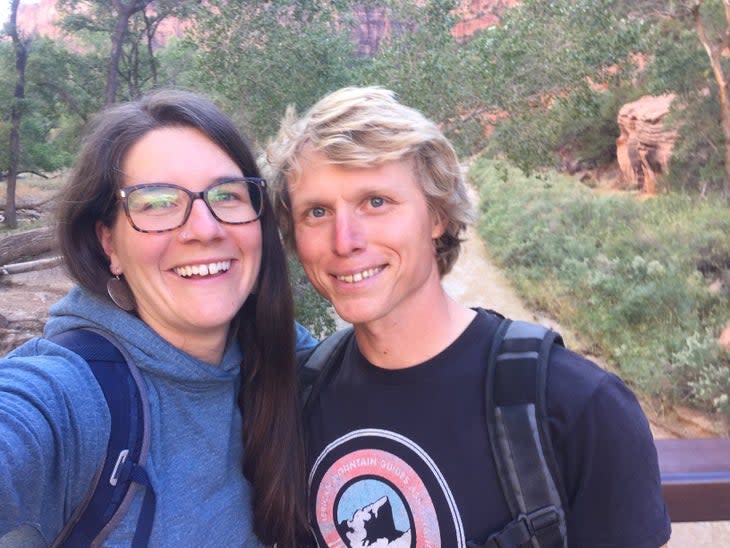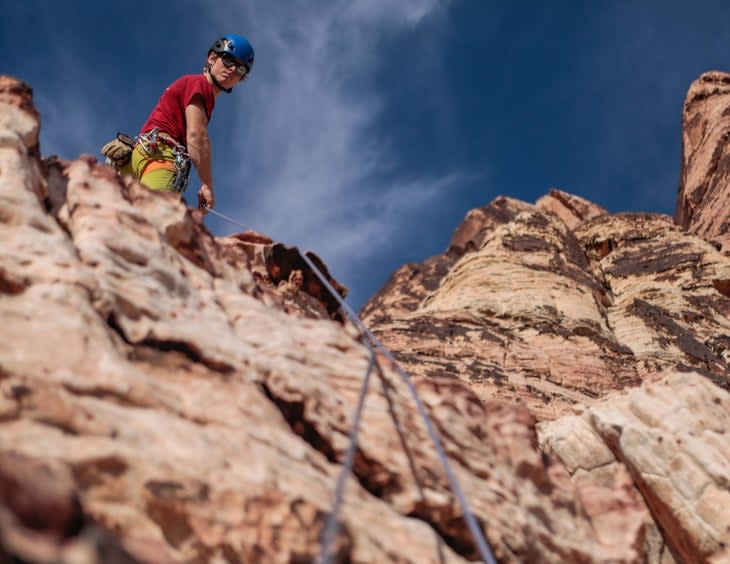Remembering Rock Guide and Educator Cody Bradford
This article originally appeared on Climbing
If you or someone you know is in crisis, please call or text the Suicide & Crisis Lifeline’s toll-free phone number: 9-8-8. 988lifeline.org.
Cody Bradford was a talented and well-known rock guide with a decade of guiding experience under his belt. But his impact went far beyond in-person clinics and chance encounters at the crag; if you're a climber who uses social media, chances are you've seen Bradford's wildly popular instructional videos, notably his #TechTipTuesday clips, a vast resource of free professional instruction.
Bradford, 34, died by suicide on September 1. His mental health was something he’d openly shared and struggled with throughout his life, said close friend Derek DeBruin. "We had a few conversations at times over the years where Cody wasn't in such a good place," he said. "He'd had a rough upbringing, he had darker times. I know he sought counseling, and it seemed like he was doing the right things, on the right path. But you never really know."
Bradford, raised in the foster care system, eventually found legal guardians in Virginia. After Bradford attempted suicide in 2008, one of his close friends in Virginia encouraged him to change things up and to "get a new scene," DeBruin said. Shortly after, Bradford moved south to Boone, North Carolina, to attend college at Appalachian State. He found new purpose there: the town's outdoor-focused lifestyle. Bradford began interning with the state's Outward Bound chapter in 2010 (where he met DeBruin), shortly before graduating from App State with a bachelor's degree in Recreation Management in 2011.

He earned his AMGA Single Pitch Instructor cert the following year and went on to guide for several small outfitters in the Southeast before signing on with Fox Mountain Guides (FMG), one of the oldest and most prominent guiding companies in the region, in 2014. After four years at Fox, Bradford earned AMGA Rock Guide certification and moved out west to chart his own course as a guide.
At the time of his death, he lived in Salt Lake City, regularly guiding in the Wasatch and Red Rock, among other locales. He was also an apprentice Alpine Guide, working towards earning his full AMGA Alpine and Ski Guide certifications. Along with Rock, Ski and Alpine are the other two-thirds of the IFMGA curriculum, and Bradford hoped to earn the prestigious IFMGA certification within the next few years.
Bradford guided for many outfitters in the western US in the last four years, and was a leading ambassador for the guide-booking platform 57Hours, among other brands. "It was [Bradford's] love for people, enthusiasm for guiding, and determination to become a fully certified mountain guide that impressed us and motivated us to build this company," 57Hours penned on his author page in memoriam. "Cody was more than just an ambassador for 57Hours; he became a great friend to all of us," said founder Viktor Marohnic. "I learned from him every day by watching him work hard and take on challenge after challenge."
On the wall Bradford moved "fluidly," said DeBruin. "He could just flow." But for DeBruin, climbing with Bradford wasn't special because he was a strong or skilled climber (although he was both). "For one, I always knew that if shit hit the fan, Cody would be able to deal," he said. "He had huge resilience. But he also was just super supportive in the way you want your belayer to be--whether stuff's hard, scary, runout, loose--with some partners you feel pressure, like 'Oh you gotta do this thing, it's your pitch, you signed up for this.' With Cody, I never ever had that vibe. It made it easier to climb hard because I knew if I wasn't good to go, he wasn't gonna be on me."

Elizabeth "Benny" Dalley, Bradford's partner of seven years, echoed that sentiment. "When I think about what I loved most about Cody, and what made him such an amazing partner and guide, I think about how supportive he was, in a gentle and positive way," she said. "There was never any judgment. If you needed to curse or cry or turn back, he always supported you. If you needed to try a move over and over and over again, he'd catch you with the utmost patience. He'd simultaneously let you sit with your fear and convince you that you were capable and strong and that there was no reason to fear."
"It was a tragedy that he couldn't apply any of that to himself," she continued. "He was always so hard on himself, always striving, always under pressure. Some of that was self-made, but most of that came from an intense desire to prove the world wrong. To prove wrong everyone who ever told him he wouldn't make it."
In addition to climbing, Bradford was skilled in many other hobbies, including bass guitar. He had originally hoped to work as a studio bassist, before discovering rock climbing. "He was a good musician with a lot of instruments," said DeBruin, "but he was a mad awesome bass player, like wicked good."
DeBruin also reminisced on how "being the mega-nerds we were" the pair kept in touch by sharing articles about urban planning, public transportation, and city design. At times, Bradford floated the idea of one day going to grad school for urban design. "To Cody, it represented this confluence of social, economic, and environmental justice," said DeBruin. "He was like 'Man, if we could just get public transit in these cities, think about how much better things would be for everyone--air pollution would go down, fossil fuels down, people could get to work easier...."
Bradford had an intense care for anyone he was climbing with, whether a friend or a client, said DeBruin, bolstered by an unparalleled ability to make light of the worst situations. DeBruin recalled a time when an individual suffered a heart attack while he and Bradford were at the crag for an Outward Bound staff training. "We got all the ropes down, rallied together, and Cody helped me organize the evac for this dude. Finally, we got him down to the trailhead and out, then put all our coworkers in the van. Cody and I just collapsed in the gravel on the pullout, chugging water, breathless," DeBruin said.
"I was like, 'Hey man, you think homie survived?' and Cody just looked over and said, 'You know, surviving something like that would take a whole lot of heart.'"
"Was a hell of a bad joke," said DeBruin, laughing, "but that was just Cody. Always ready to make the best of a bad situation."
While Bradford was still in the early years of his journey as a mountain guide, his instructional videos were already incredibly successful, perhaps more popular than any other climbing instructor online. Each of his Instagram videos--offering advice on anchor building, knot tying, gear placement, and other crucial climbing skills--regularly racked up several thousand likes, and he'd garnered nearly 70,000 followers as a result. With his death, climbers have lost more than a skilled climber and guide, but a passionate educator with a true knack for presenting valuable knowledge in an engaging, concise format.

"One of the things that made him such a great guide was that he was a great educator," said DeBruin. "But he was a great educator because he really educated himself a lot of the time. He honed his craft out there, practiced with his peers, sought mentorship, studied, learned... anything he could get his hands on."
When we spoke last week, DeBruin admitted that he was both at a loss for words and capable of talking endlessly about the beauty of Bradford's character, and his impact as a guide, educator, and friend. "It's impossible to encapsulate a person's whole life in a phone call," he said. "All I can really say is that the world's a little less without him."
"I've heard trauma described as a backpack that one carries," said Dalley, "a burden one can't ever put down. We all tried to carry some of that for him, but it was never enough, and at the end of the day he wouldn't let us carry that weight because he cared for us and he knew it would cause us pain."
"He's not carrying that backpack anymore, and for that we can be grateful."
Bradford's friends and family have set up a GoFundMe to cover his memorial costs, with the remainder donated to a forthcoming recipient organization that will "best encapsulate what Cody cared about and the barriers he faced in this industry."
If you or someone you know is in crisis, please call or text the Suicide & Crisis Lifeline’s toll-free phone number: 9-8-8. 988lifeline.org.
For exclusive access to all of our fitness, gear, adventure, and travel stories, plus discounts on trips, events, and gear, sign up for Outside+ today.
